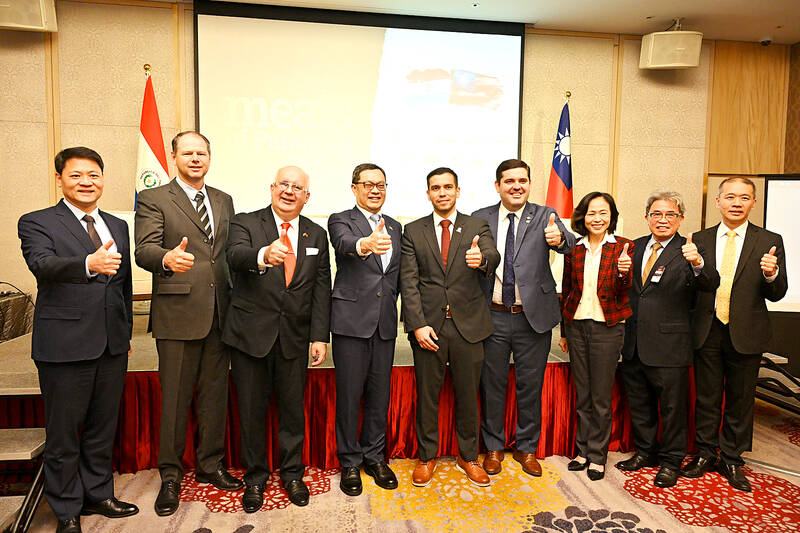Taiwanese importers and Paraguayan exporters gathered in Taipei yesterday to discuss bilateral commercial ties at the "Meats of Paraguay Reception Dinner."
In a news release, the event’s organizer the Paraguayan Meats Association said it was held to serve as a key platform for reinforcing Paraguay’s role as a reliable meat supplier and to explore further trade opportunities.
In an address to the reception, Taiwan’s Deputy Minister of Foreign Affairs Chen Ming-chi (陳明祺) said the latest figures showed Paraguay was now Taiwan’s second-largest source of frozen beef imports, accounting for 11 percent of the total imports.

Photo: Tien Yu-hua, Taipei Times
Taiwan was also the largest overseas destination for Paraguayan pork, accounting for 88 percent of the South American country’s total pork exports, Chen said. "This demonstrates the confidence of Taiwan’s consumers in Paraguayan meat products," said Chen, who took up his post as deputy foreign minister last week.
According to Chen, Taiwan’s executive and legislative branches were working on reducing tariffs on Paraguayan pork products as soon as possible.
"Once finalized, Paraguay will become the first country to enjoy zero tariffs on pork exports to Taiwan. This certainly will further spur bilateral trade, as Taiwanese consumers will have greater access to high-quality Paraguayan pork," he added.
A delegation from Paraguay also attended the event.
Among those in the Paraguayan delegation were the country’s Vice Minister of Exports and Investments Javier Viveros and President of the Paraguayan Meats Association Randy Ross Wiebe.
In 2024, Paraguay exported over 35,000 tons of beef and offal to Taiwan, valued at over US$200 million, along with 9,000 tons of pork, worth approximately US$30 million, according to the Paraguayan Meats Association.
Paraguay is one of 12 countries, and the only one in South America, to maintain diplomatic relations with the Republic of China, Taiwan’s official name.

Taiwan yesterday condemned the recent increase in Chinese coast guard-escorted fishing vessels operating illegally in waters around the Pratas Islands (Dongsha Islands, 東沙群島) in the South China Sea. Unusually large groupings of Chinese fishing vessels began to appear around the islands on Feb. 15, when at least six motherships and 29 smaller boats were sighted, the Coast Guard Administration (CGA) said in a news release. While CGA vessels were dispatched to expel the Chinese boats, Chinese coast guard ships trespassed into Taiwan’s restricted waters and unsuccessfully attempted to interfere, the CGA said. Due to the provocation, the CGA initiated an operation to increase

CHANGING LANDSCAPE: Many of the part-time programs for educators were no longer needed, as many teachers obtain a graduate degree before joining the workforce, experts said Taiwanese universities this year canceled 86 programs, Ministry of Education data showed, with educators attributing the closures to the nation’s low birthrate as well as shifting trends. Fifty-three of the shuttered programs were part-time postgraduate degree programs, about 62 percent of the total, the most in the past five years, the data showed. National Taiwan Normal University (NTNU) discontinued the most part-time master’s programs, at 16: chemistry, life science, earth science, physics, fine arts, music, special education, health promotion and health education, educational psychology and counseling, education, design, Chinese as a second language, library and information sciences, mechatronics engineering, history, physical education

The Chinese military has boosted its capability to fight at a high tempo using the element of surprise and new technology, the Ministry of National Defense said in the Quadrennial Defense Review (QDR) published on Monday last week. The ministry highlighted Chinese People’s Liberation Army (PLA) developments showing significant changes in Beijing’s strategy for war on Taiwan. The PLA has made significant headway in building capabilities for all-weather, multi-domain intelligence, surveillance, operational control and a joint air-sea blockade against Taiwan’s lines of communication, it said. The PLA has also improved its capabilities in direct amphibious assault operations aimed at seizing strategically important beaches,

‘MALIGN PURPOSE’: Governments around the world conduct espionage operations, but China’s is different, as its ultimate goal is annexation, a think tank head said Taiwan is facing a growing existential threat from its own people spying for China, experts said, as the government seeks to toughen measures to stop Beijing’s infiltration efforts and deter Taiwanese turncoats. While Beijing and Taipei have been spying on each other for years, experts said that espionage posed a bigger threat to Taiwan due to the risk of a Chinese attack. Taiwan’s intelligence agency said China used “diverse channels and tactics” to infiltrate the nation’s military, government agencies and pro-China organizations. The main targets were retired and active members of the military, persuaded by money, blackmail or pro-China ideology to steal